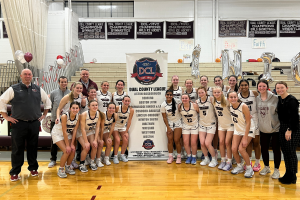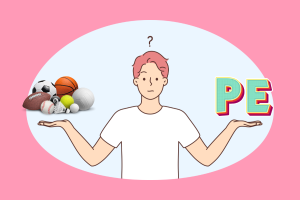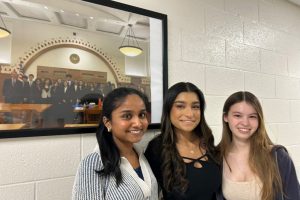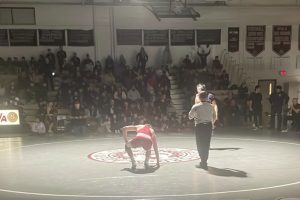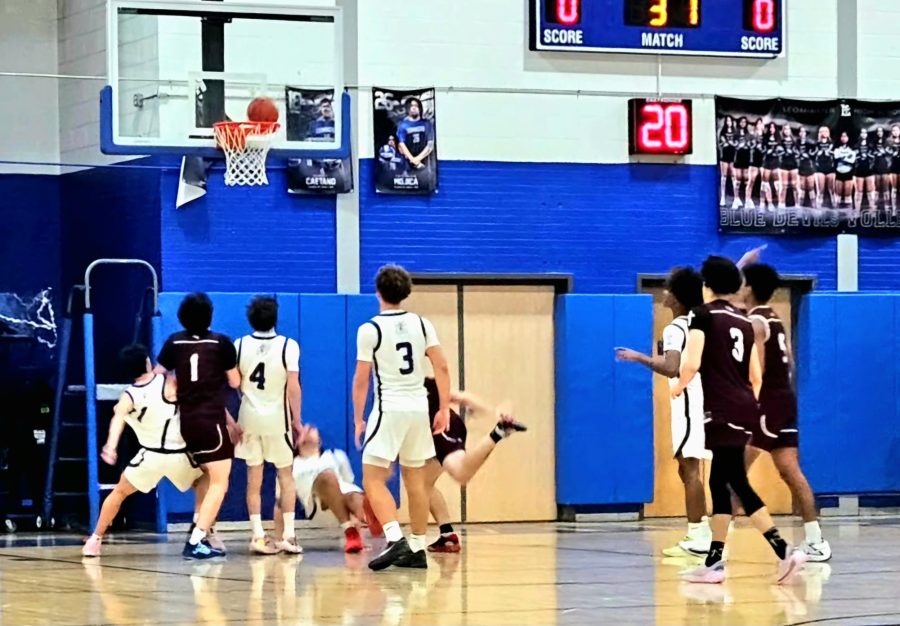Curran arrives from Stony Brook
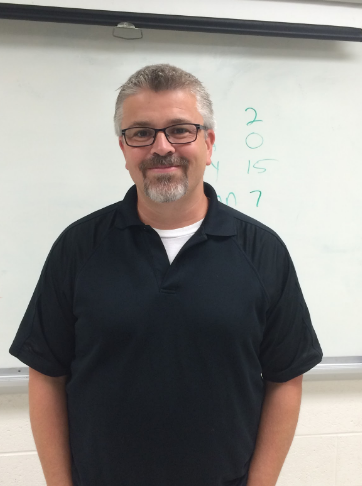
Click here to read about Mr. Curran
October 10, 2016
Mr. Curran is the new teacher for freshman in both Honors and CP1 World History II classes. Last year, he was an Ancient History teacher for 7th graders at Stony Brook Middle School, but is now here at WA for one year, on exchange program, as he describes below.
Q: How many years have you been teaching?
A: This is starting my 15th [year].
Q: What are your first impressions of WA?
A:[it is] large and complicated. There’s a lot of moving parts, far older students than I’m used to working with, and a real separation between the staff. I’ve met only maybe 25% of the people that actually work inside of this building. It’s not a bad thing, just the nature of the building.
Q: What was the point in your life when you really wanted to get into teaching?
A: Senior year of high school, and it was when I was reading 1984, a classic by George Orwell. The idea that the person that controls the past, manipulates the present, and charts the future. A big chunk of that book was how things could go down the memory hole, and once they were lost, then you could make up whatever you wanted in order to get the public to do whatever you wanted them to do.
Q: What was the high school and college you went to?
A: I went to Danvers High, graduating class of 1990, and Franklin Pierce University, although it was called Franklin Pierce College then. I got my master’s degree through Worcester State.
Q: What brought you to Westford Academy?
A: Exchange program. I am doing an exchange with the high school teacher, Mrs. Everett. She’s going to be at Stony Brook for a year, and I’m up here. Its for both of us to get a taste of the opposite educational education, you see what middle schools like, I see what high school is like.
Q: What have you learned in the 4 weeks so far?
A: The expectation is much higher than it was in middle school, of course, and but also the maturity of the students is longer than what I see in 6th, 7th and 8th grade. We all maintain that, between those grades, there’s a tremendous amount of growth and development. 6th graders aren’t like 7th graders, 7th graders aren’t like 8th graders. In turn, freshman aren’t like 8th graders. You still have some echos of resemblance, but by and by its a very different experience.
Q: What is your favorite thing about teaching?
A: Interaction with the students. I’ve worked in a variety of jobs that would pay me more than teaching, when I made the jump over to teaching. It’s the interaction, because I’m a super history nerd, that I get to do what I love, and educate people in regards to history, and that those moments where kids go, oh my God, I get it now! that make it worthwhile. It’s basically about the interaction with the kids, and with the subject matter. It’s all for the children.
Q: What were some the other jobs you had before teaching?”
A: I worked for the marketing and advertising department at BJ’s Wholesale, a shipping manager for a pharmaceutical company. I met some really nice people, but I did not like them. They weren’t, fun, fulfilling. A lot of career clemors. Like, oh! I want to be the president of, this! And Oh! I want to be the vice president of this. Once you get into teaching, you’re a teacher. Yeah, you have a variety of levels of teachers, as far as who’s a veteran, there’s no career back stabbing. It’s pleasant!
Q: What are your least favorite parts about teaching?
A: Paperwork. The amount of documentation a teacher is required to do now, in regards to our professional licence, to the students, proving what we do, requires a tremendous measured amount of data, and paperwork. I feel it is a barrier, in certain ways, in between what we like to do with the students, and how we like to approach our subjects.
Q: What has been your most important lesson you have learned while teaching?
A: To be careful of assumption. I got a student a few years ago who was very, very well versed in history, and that’s not something I usually get with a seventh grader. It was to the point that some of the stuff they were reading was far above their expected reading level, and the conversations the student and I had, it was just very rare. I’ve had students that were well read, but never well read history students. I had a student the first year of teaching, and we used to do stupid bets, I don’t do them anymore because I learned, when he said, ‘I bet I can throw a fastball and you can’t hit it out of the infield, and I said , ‘this kid’s twelve! I’m gonna ruin him!’. When he went into his windup, and threw the ball, I swear, I never saw it. I saw his hand move, then I heard the ball hit the glove. Yeah, he could throw eighty-five miles per hour at the age of twelve. I ended up having to buy him hot chocolate for the rest of the week. It was a good lesson to learn. Kids come to the classroom with skill sets that can be beyond what you expect, and you have to keep an open mind about it. Just because someone is twelve or thirteen, the age group I work with, does not mean they can’t figure it out, that they don’t come to the table with some history knowledge already in place. They might have a skill set that is far above their age. The other one is to be kind. I can’t speak for high school, I can only speak for middle school, that the kids are in a weird, odd, emotional, twisted period in their lifetimes, and the last thing they need is an old grumpy history teacher.
Q: What is the best memory you have from one of your past classes?
A: Probably because it was talked about so recently, the Crogan Scale of Horror. I had a student, last name was Crogan, very sweet and nice. Now, I teach Ancient history, it is a horrible, terrible thing, and I tow the PG-13 line, as much as I can, but she was horrified by a lot of the things, so she put a scale on my back wall. Numbered one through ten, one being low level, no problem, then 10 being therapy forever. At that point I had forgotten that I had twelve and thirteen year olds in front of me, what happened was I would say that I wanted to talk about what happened in a certain ancient battle, other students would look at me like, “Uh, uh, uh”, and she would get up, quietly, walk over and move the magnet up and sit right back down, give me the shame fingers occasionally.
Q: Has teaching changed you and your way of thinking about life?
A: That is a very good question. It’s made me a happier person. I come to school happy, I leave happy. I laugh throughout the day, yet, yes, I have a serious job to perform. It’s the human connection, especially with middle school, and now high school kids, that I have a very strange and awesome responsibility to help students along, not only academically, but also socially, to model for them.
Q: Do you have any kids at home, and if you do, do you teach them history?
A: I have two kids at home, a five year old and a four year old, and my wife has said no to the teaching of history right now. It’s not a direct quote, but something along the lines of, ‘You don’t need to scar them that young’. Side note- do you remember when I went over the possible history of Ring Around the Rosie? What you guys thought in the beginning of the year, that history is all just a myth, like, ‘Oh my God, that’s the worst thing ever!’ My kids come home from preschool, and they were doing Ring Around the Rosie, and I looked at them, and I looked at my wife and she says, ‘Say one word, and you’re wearing that dinner’. So nothing right now.
Q: If you could go back in time to tell one thing to your high school self, what would you say?
A: It ends. High school ends. I did not have an overly enjoyable educational experience. So like most kids at age 11 and 12, the world is yours. But it ends, you go off into the world, and you grow further from what you were, hopefully. It’s the truth, you know, things have gotten better in high school, but some things are the same. There’s still some people, social groups or situations that you never ever see again, and you go off to college or to a job, or go to Iowa for some strange reason to raise corn, you’re pulled out. Did I make friends I still have through middle and high school? Yes, I did, they’re the ones that got me through. And that’s the other best thing, it’s that you get to leave with what you want.
Q: Winston Churchill once said that “Success is not final”. How will you plan to continue to become an even better teacher in the future and your time at WA?
A: The key to being a successful teacher, in my opinion, is to never let it get stale. Change things up, try things new. Remember all the horrible things you did in your first few years of teaching and learn from them. I know for teachers, ‘Always try things new, keep things fresh’, it’s one the things that are still quite true. Change, Try something new. And how I’ll get better at teaching from WA? It’s the trying something new. All new curriculum, all new ways of dealing with students, and it’s a different complexity for the age level.
Q: What do you want the people at WA to know about you?
A: That I’m really not insane. Actually, I’m touched that so many of you remember me. 7th grade is a long time ago, in a lot of ways, and I remember, when I was in high school, we called it junior high, that it was so far back, when I was a junior thinking about 7th grade, and it’s light years away. I walk these halls, and so many students, I wish I could remember all of their names, they are all so bigger now, and their beards! It touches me that they still remember me and will bring up lessons that I taught and had done, or class jokes, or the Olympics, or any of the things we did that year. Most people forget junior high for good reasons. No one looks back, usually, and says, ‘God I loved that. All that awkwardness and the weirdness, and the cliques and people being mean, and the bullying, oh! It was so much fun! The awkwardness, the insecurities, anxiety’. 7th and 8th grade are the worst, and to have students remember me, in such a positive light, hopefully means that I taught them something.

